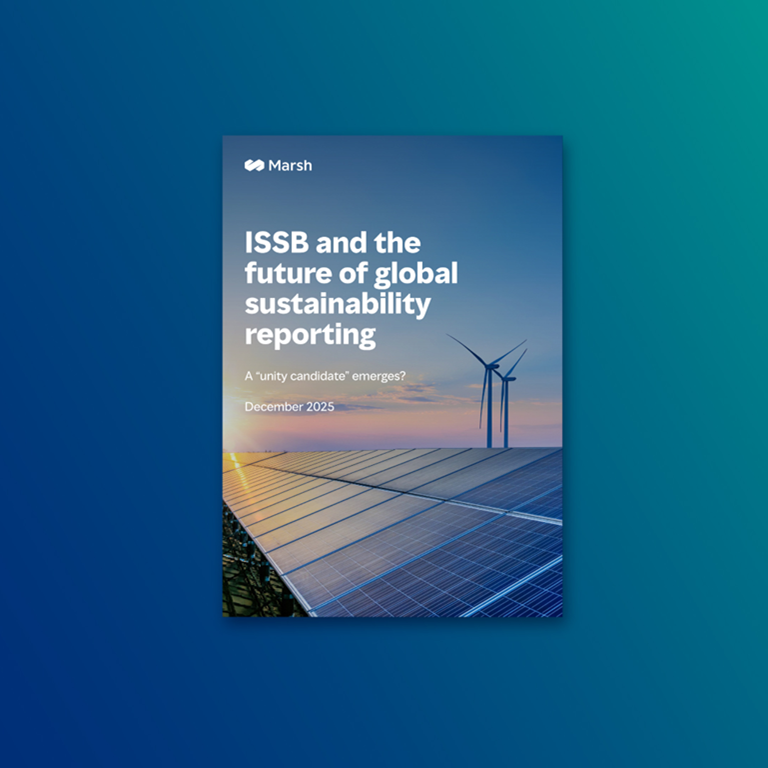
By Nick Faull ,
Head of Climate & Sustainability Risk, Marsh
07/11/2025 · 4 minute read
London Climate Action Week is now in its seventh year, and this was by far the busiest iteration I've ever been to. There was a notable increase in activity and attendance. With two-hour queues for some events, and widespread competition for tickets, the growing significance of this UK event was palpable.
It was not only levels of activity that were high, but also the sense of optimism. In light of recent policy shifts around the world, one might have expected the mood to be more somber compared to last year. However, the upbeat energy on the ground told a different story.
Across the week’s events, the trend towards an increasing focus on adaptation continued, alongside the transition to net zero. I was struck by a distinct focus on implementation: moving from designing solutions to actually financing and deploying them. One phrase that echoed through the week was “this is the implementation decade”.
A roundtable hosted by Marsh and Oliver Wyman brought together representatives from government, insurance, asset management, and banking to explore the UK’s need for transition financing, and the role insurance can play. For example, insurers are responding to business demand for support for new business models and technologies.
On both the transition and adaptation, insurance has a key role in creating solutions that help to catalyze implementation by de-risking investment in a way that unlocks finance.
The theme of nature was very present in London, including at our webinar on harnessing nature for resilience and how the insurance community can help to bridge the nature finance gap. We are really starting to see a focus on how to quantify nature’s value and make the business case for funding nature-based projects — from urban parks to alleviate the impact of heatwaves, to mangroves for protection against coastal flooding.
Insurance can play an important role in developing real-world solutions. One way to quantify the benefits of nature-based solutions, for example, is to integrate them into catastrophe models. The reduced risk can potentially lead to lower insurance premiums and improved access to insurance for vulnerable areas.
I was glad to take part in an interesting roundtable on adaptation and resilience, where leaders from insurance, finance, and government explored how to encourage investment in climate adaptation — an especially critical need for vulnerable areas. It clearly emerged from the discussion that there is no “one size fits all” solution; rather, tailored solutions are needed based on regional and contextual factors.
In developed markets, for instance, there is growing concern about access to insurance, particularly the changing availability and affordability of coverage as extreme weather risks increase. Insurance is a widely used mechanism in developed markets, but it needs to evolve further to effectively incorporate adaptation measures.
Many emerging markets, however, face a dual challenge: they not only experience pressure on the availability of insurance because of increasing risks, but also contend with low insurance penetration overall. In regions where insurance is not already widely used, it is important to address this protection gap by designing products that meet local needs.
During discussions at London Climate Action Week, three key approaches emerged for the insurance sector to tackle the challenges of the protection gap and insurability:
At any major climate gathering, there is always an eye on the next opportunity to make meaningful progress. In London, there was a general sense of anticipation that COP30 — to be held in Belém, Brazil, towards the end of the year — has the potential to become a significant milestone.

Report,Featured insight
01/05/2026
Marsh Risk is a business of Marsh.
This document and any recommendations, analysis, or advice provided by Marsh (collectively, the “Marsh Analysis”) are not intended to be taken as advice regarding any individual situation and should not be relied upon as such. The information contained herein is based on sources we believe reliable, but we make no representation or warranty as to its accuracy. Marsh shall have no obligation to update the Marsh Analysis and shall have no liability to you or any other party arising out of this publication or any matter contained herein. Any statements concerning actuarial, tax, accounting, or legal matters are based solely on our experience as insurance brokers and risk consultants and are not to be relied upon as actuarial, tax, accounting, or legal advice, for which you should consult your own professional advisors. Any modeling, analytics, or projections are subject to inherent uncertainty, and the Marsh Analysis could be materially affected if any underlying assumptions, conditions, information, or factors are inaccurate or incomplete or should change. Marsh makes no representation or warranty concerning the application of policy wording or the financial condition or solvency of insurers or reinsurers. Marsh makes no assurances regarding the availability, cost, or terms of insurance coverage. Although Marsh may provide advice and recommendations, all decisions regarding the amount, type or terms of coverage are the ultimate responsibility of the insurance purchaser, who must decide on the specific coverage that is appropriate to its particular circumstances and financial position.
1166 Avenue of the Americas, New York 10036
Copyright © 2025, Marsh LLC. All rights reserved. 24-362084-GL